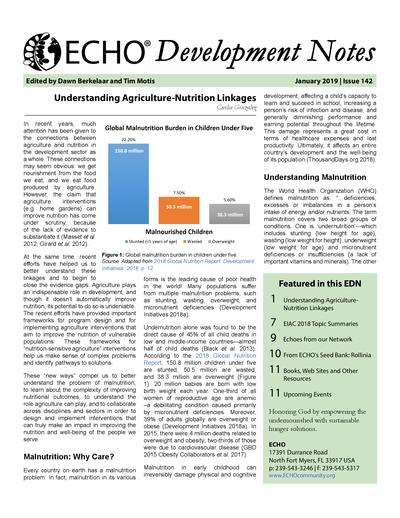ECHO Development Notes (EDN)
At the center of our work is ECHO Development Notes (EDN), which we send quarterly to thousands of people in over 160 countries in three languages (English, French, and Spanish). In EDN we share the most helpful, practical information that we come across about growing food under difficult circumstances.
Within each issue you'll find featured techniques, practices, information and experience to help guide your work in tropical and subtropical agricultural development. Also in EDN are "Echoes from Our Network," "From ECHO's Seed Bank," and more. Issues #1-51 were compiled in the 1990s into the Amaranth to Zai Holes book, which or you may read it online here. Also, Agricultural Options for Small Scale Farmers, expanded on the foundation from Amaranth to Zai Holes by covering EDN 52 through 100, with articles from outside contributors. Agricultural Options for Small Scale Farmers is available for purchase from the ECHO Bookstore and Amazon.
If you would like to browse EDNs via our Index, please click here.
175 Issues in this Publication (Showing issues 146 - 137) Previous | Next
EDN Issue #146 - 2020-01-27
- Also available in:
- Français (fr)
- Español (es)
Low Oxygen Methods for Insect Control in Seeds
ECHO International Agriculture Conference 2019: Topic Summaries
Echoes from our Network: Roger Gietzen on the topic of syntropic farming
Books, Web Sites and Other Resources: Vetiver Latrine
EDN Issue #145 - 2019-10-18
- Also available in:
- Español (es)
- Français (fr)
Pest Prevention: The Foundation of Integrated Pest Management
Echoes from our Network: Nutrition Education in the Context of Community Agriculture Programs
From ECHO's Seed Bank: New Lima Bean Cultivars Available
Books, Web Sites, and Other Resources: Syntropic Farming Guidebook by Roger Gietzen
EDN Issue #144 - 2019-07-24
- Also available in:
- Español (es)
- Français (fr)
Echoes from our Netwok: Literacy and Agriculture and Termite Harvesting in Ghana
From ECHO's Seed Bank: Earthbag Houses for Storing Seeds
Books, Web Sites, and Other Resources: Restoring the Soil, Second Edition Book Release
EDN Issue #143 - 2019-04-26
- Also available in:
- Español (es)
- Français (fr)
Learning about and from local seed systems
Germination to Detoxify Jack Bean
Techniques to Boost Plants’ Stress Tolerance and Extend Fruit Marketability
From ECHO's Seed Bank: Fever Tree
Books, Web Sites and Other Resources: Planetary Health Diet Proposal
EDN Issue #142 - 2019-01-29
- Also available in:
- Français (fr)
- Español (es)
Understanding Agriculture-Nutrition Linkages
Echoes from our Network: Intercropping Native Shrubs
From ECHO's Seed Bank: Rollinia
Books, Web Sites and Other Resources: Feed the Future Technical Briefs
EDN Issue #141 - 2018-10-17
- Also available in:
- Français (fr)
- Español (es)
Shea Nut: The Butter Tree
For How Long Should Chaya Leaves be Boiled?
Green Leafy Vegetables: Leaf Powder for Improved Nutrition
From ECHO's Seed Bank: Jewels of Opar, An edible ornamental
SPRING Nutrition-Sensitive Agriculture Training Resource Package
EDN Issue #140 - 2018-07-18
- Also available in:
- Français (fr)
- Español (es)
Farmer Field School Trials of 2:4:2 Maize/Legume Intercropping
Laurel Wilt Disease: "Save the Guac!"
Echoes from our Network: Metal silos for grain storage
From ECHO's Seed Bank: Culantro
EDN Issue #139 - 2018-04-27
- Also available in:
- Français (fr)
- Español (es)
Anthropology as a tool for facilitating agricultural development
Invasion of the Fall Armyworm
Echoes from our Network: Millepede Damage
From ECHO's Seed Bank: Passionfruit
Books, Web Sites and Other Resources: Permaculture for Refugees in Camps
EDN Issue #138 - 2018-01-31
- Also available in:
- Français (fr)
- Español (es)
Yellow Shoot, Green Fruit: Citrus Greening Disease
EIAC 2017 Topic Summaries
Echoes from our Network: edible insect feedback
From ECHO's Seed Bank: Tree Lucerne (Tagasaste), multipurpose forage crop for the highlands
eBook Release: Agricultural Options for Small-Scale Farmers
EDN Issue #137 - 2017-10-23
- Also available in:
- Español (es)
- Français (fr)
Insects for Food and Feed
Resilient Bamboo
Invitation to LEAD Asia Web-Based Talk
Echoes from our Network: Living Fence Advice from Roy Danforth
From ECHO's Seed Bank: Tamarind, a Tart Addition for the Home Garden
eBook Releases: Options for Coping with Crop or Animal Pests, Seed Saving and Multiplication Techniques, and Understanding and Coping with Human Health Issues









